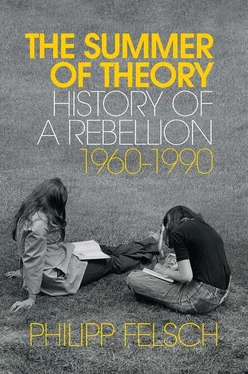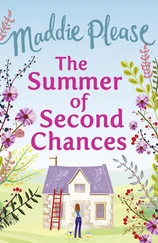1 1 Andreas Baader to Ello Michel, 21 August 1968, quoted in Klaus Stern and Jörg Herrmann, Andreas Baader: Das Leben eines Staatsfeindes, Munich: dtv, 2007, fig. 40; cf. 110–16, 177.
2 2 On the ‘highly theoretical’ motivation of the first-generation Red Army Faction, see Karl Heinz Bohrer, ‘The Three Cultures’, in Observations on the ‘Spiritual Situation of the Age’, ed. Jürgen Habermas, trans. Andrew Buchwalter, Cambridge, Mass.: MIT Press, 1984, 147.
3 3 Quoted in ‘Marcuse: Hilfe von Arbeitslosen’, in Der Spiegel, 21:25 (1967), 103.
4 4 Cf. Nikolaus Wegmann, ‘Wie kommt die Theorie zum Leser? Der Suhrkamp-Verlag und der Ruhm der Systemtheorie’, in Soziale Systeme, 16:2 (2010), 463.
5 5 Cf. Sabine Vogel, ‘Die Kunst des Verschwindens: Es begann im Geist der 68er Bewegung; Jetzt hat der Berliner Buchverleger Peter Gente sein Lebenswerk, den Merve Verlag, weitergegeben’, in Berliner Zeitung, 2 January 2008.
6 6 Ulrich Raulff, ‘Tod einer Buchmacherin: Der Merve Verlag und seine Leser haben Heidi Paris verloren’, in Süddeutsche Zeitung, 19 September 2002; cf. Dietmar Dath, ‘Schwester Merve: Zum Tod der Verlegerin Heidi Paris’, in Frankfurter Allgemeine Zeitung, 20 September 2002.
7 7 After years of archival research, Marchetti published his findings in a scholarly and voluminous work that should have been translated long ago: Valerio Marchetti, L’invenzione della bisessualità: Discussioni fra teologi, medici, e giuristi del XVII secolo sull’ambiguità delle corpi e delle anime, Milan: Mondadori, 2001.
8 8 I mean the Merve books Michel Foucault, Mikrophysik der Macht, trans. Hans-Joachim Metzger, Berlin: Merve, 1976, and Paul Veyne, Der Eisberg der Geschichte: Foucault revolutioniert die Historie [The iceberg of history: Foucault revolutionizes history], trans. Karin Tholen-Struthoff, Berlin: Merve, 1981.
9 9 Quoted in Merve Lowien, Weibliche Produktivkraft: Gibt es eine andere Ökonomie? Erfahrungen aus einem linken Projekt [Female productive power: is there a different economics? Experience of a leftist project], Berlin: Merve, 1977, 153. On Gente’s circle of acquaintance, see Jürg Altwegg, ‘Die Merve-Kulturen: Ein Verlags- und Verlegerporträt’, in Die Zeit, 22 July 1983; and Heinz Bude, ‘Die Suche nach dem Unmöglichen: Paul Arnheim und die Bücher’ [The search for the impossible: Paul Arnheim and books], in Bude, Das Altern einer Generation: Die Jahrgänge 1938 bis 1948, Frankfurt: Suhrkamp, 1995, 225. The pseudonymous Paul Arnheim of Bude’s study is Peter Gente.
10 10 Email to the author, 9 December 2011.
11 11 Altwegg, ‘Die Merve-Kulturen’, mentions that there were Merve books among the effects of the Stammheim prisoners. According to Stern and Herrmann, Andreas Baader, 177, many leftist publishers provided their books to the terrorists at no cost.
12 12 Jacob Taubes, ‘Secondary Recommendation on the Working Plan and Application for a Graduate Stipend of Hans-Peter Gente’, 15 July 1974: Merve archives, Karlsruhe Centre for Art and Media Technology (ZKM).
13 13 Henning Ritter, Notizhefte, Berlin Verlag, 2010, 24.
14 14 A more nuanced view is in order here. As Lorenz Jäger has remarked, the cohort born around 1935 produced the best observers of the ’68 activists – who were a few years younger than themselves. Peter Gente, born in 1936, could be counted among those observers. See Lorenz Jäger, ‘Die Jahre, die ihr nicht mehr kennt: Mission Zeitbruch; Fotos von Abisag Tüllmann im Historischen Museum Frankfurt’, in Frankfurter Allgemeine Zeitung, 26 November 2010.
15 15 On the problem of gender roles in the Merve collective, see Lowien, Weibliche Produktivkraft. See also Wolfert von Rahden and Ulrich Raulff, ‘Distanzgesten: Ein Gespräch über das Zeitschriftenmachen’, interview with Moritz Neuffer and Morten Paul, in Grundlagerforschung für eine linke Praxis in den Geisteswissenschaften, 1 (2014), 67–9.
16 16 The video adaptation of Heiner Müller’s text ‘Bildbeschreibung’ was never made, to my knowledge. See the extensive documentation of the project in the Merve Archives.
17 17 Merve Verlag to Sylvère Lotringer, 25 March 1981: Merve Archives. The outgoing correspondence of the Merve publishers is quoted here and subsequently from archived drafts, some of which were posted in translation.
18 18 Heidi Paris, Drei Reden zum Design: Der Spaghettistuhl [Three talks on design: the spaghetti chair], Berlin: Merve, 2012, 10. On Berlin’s traditional self-identification with the zeitgeist, see Patrick Eiden-Offe, ‘Hipster-Biedermeier und Vormärz-Eckensteher (und immer wieder Berlin)’, in Merkur, 786 (2014), 980–8.
19 19 George Steiner, ‘Adorno: Love and Cognition’, in Times Literary Supplement, 9 March 1973, 255.
20 20 According to recent research on literary genres, reader expectations play a key part in the emergence of genres. Cf. Wilhelm Vosskamp, ‘Gattungen als literarisch-soziale Institutionen’, in Textsortenlehre: Gattungsgeschichte, ed. Walter Hinck, Heidelberg: Quelle & Meyer, 1977, 27–44. For new thoughts, see Franco Moretti, Graphs, Maps, Trees: Abstract Models for a Literary History, London: Verso, 2005.
21 21 ‘The texts we devoured in those days stimulated movement. Whether the middle Marcuse, Walter Benjamin, the early Marx or certain chapters of Capital – they were interchangeable. What mattered was definitively escaping the stifling air of the 1950s’, Helmut Lethen once said about reading theory in the sixties. ‘Fantasia contrappuntistica: Vom Ton der Väter zum Sound der Söhne’, interview with Helmut Lethen, in Sabine Sanio, 1968 und die Avantgarde: Politisch-ästhetische Wechselwirkungen in der westlichen Welt, Sinzig: Studio, 2008, 98. Especially noteworthy among more recent memoirs are Helmut Lethen, Suche nach dem Handorakel: Ein Bericht, Göttingen: Wallstein, 2012; and Ulrich Raulff, Wiedersehen mit den Siebzigern: Die wilden Jahre des Lesens, Stuttgart: Klett-Cotta, 2014. Important remarks on theory are also found in Karl Heinz Bohrer, ‘Sechs Szenen Achtundsechzig’, in Merkur, 708 (2008), 410–24, and Hans Jörg Rheinberger, Rekurrenzen: Texte zu Althusser [Recurrences: texts on Althusser], Berlin: Merve, 2014. For an American perspective that is analogous to that of Merve Verlag in many respects, see Sylvère Lotringer, ‘Doing Theory’, in French Theory in America, ed. Lotringer and Sande Cohen, New York: Routledge, 2001, 125–62.
22 22 To name just a few examples: Martin Jay, The Dialectical Imagination: A History of the Frankfurt School and the Institute of Social Research, 1923–1950, Boston: Little, Brown, 1973; François Dosse, History of Structuralism, 2 vols., trans. Deborah Glassman, Minneapolis: University of Minnesota Press, 1997; Vincent Descombes, Modern French Philosophy, trans. L. Scott-Fox and J. M. Harding, Cambridge University Press, 1980, 182f.; Ingo Elbe, Marx im Westen: Die neue Marx-Lektüre in der Bundesrepublik seit 1965, Berlin: De Gruyter, 2008.
23 23 On the importance of Althusser’s ‘theoretical practice’ for the history of science, see Hans-Jörg Rheinberger, ‘My Road to History of Science’, in Science in Context, 26:4 (2013), 639–48; Philipp Felsch, ‘Homo theoreticus’, in Eine Naturgeschichte für das 21. Jahrhundert: Hommage à, zu Ehren von, in Honor of Hans-Jörg Rheinberger, ed. Safia Azzouni, Christina Brandt, Bernd Gausemeier, Julia Kursell, Henning Schmidgen and Barbara Wittmann, Berlin: Max-Planck-Institut, 2011, 204–6. Later concepts to which this book is indebted include the ‘discursive practices’ introduced by Michel Foucault in the Archaeology of Knowledge (trans. A. M. Sheridan Smith, London: Tavistock, 1972), and also the stylistics of ‘intellectual practices’ proposed by Michel de Certeau (The Practice of Everyday Life, vol. I, trans. Steven Rendall, Berkeley and Los Angeles: University of California Press, 1984), and Ivan Illich’s ‘historical ethology of reading’ (In the Vineyard of the Text: A Commentary to Hugh’s Didascalicon, University of Chicago Press, 1993). For a current attempt to bring together the history of philosophy and the history of science, see Darrin McMahon and Samuel Moyn (eds.), Rethinking Modern European Intellectual History, Oxford University Press, 2014.
Читать дальше












